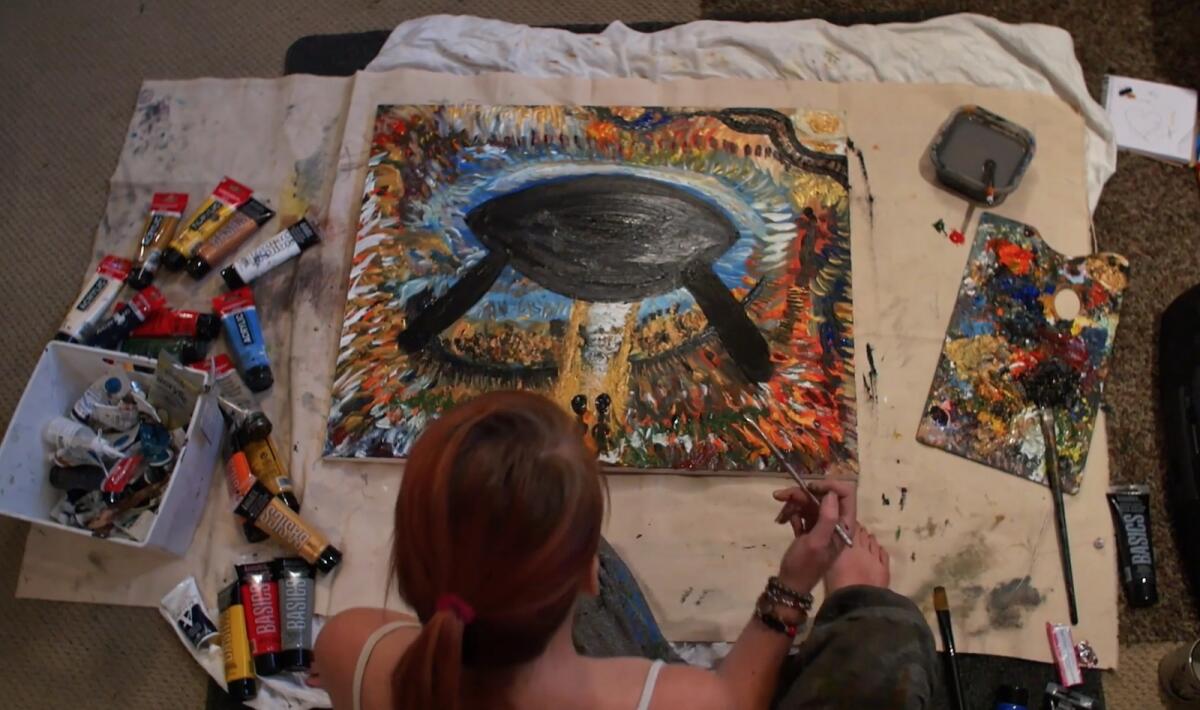‘Broadway Rising,’ ‘White Noise,’ ‘Matilda’ and more movies to watch at home

- Share via
‘Broadway Rising’
At the start of the COVID-19 pandemic, a few major developments signaled that life as we knew it was going to be different for a while. When the major sports leagues shut down, that was a shock. When restaurants moved to takeout-only, that was another. But one of the most chilling changes was the total shuttering of the Broadway theater — an American institution that previously had soldiered on through wars, terrorist attacks and economic downturns. The show, for once, did not go on.
The title of Amy Rice’s documentary “Broadway Rising” reflects the end of the story, when the curtains rose again and audiences — tentatively, and masked — started coming back. But the film is just as much about the early, scary days, when thousands of New Yorkers — including some Broadway stalwarts — started getting sick and dying, and life and work ground to a halt. Rice and her crew checked in over the course of the hiatus with people who rely on a thriving theater district for their livelihoods — not just actors and dancers but costumers, ushers and set dressers. The movie covers both the mortal fear that initially gripped the community and the more existential worries as people went months without paychecks or seeing friends.
“Broadway Rising” is roughly chronological, beginning with that brief, hopeful moment when people thought quarantine might last just a month. Rice then gets into how people spent their break. Some engaged in relatively lighthearted pastimes such as hosting livestream performances or teaching classes online. Others got involved with more serious endeavors, such as joining activist movements in the wake of George Floyd’s death. The second half of the film changes gears, covering the expensive and painstaking efforts that went into reopening (mostly) safely.
The movie’s “and then this happened” structure can feel a little scattered, as Rice bounces among different people’s personal stories without developing any narrative momentum. But those stories are still moving, especially given that nearly everyone watching “Broadway Rising” will have been through something similar. The further we move away from the darkest months of the pandemic, the more documentaries like these will be valuable, as a reminder of what it was like to swab up and mask up just to do the most natural human thing: spending time with other people.
‘Broadway Rising.’ Not rated. 1 hour, 37 minutes. Available on VOD

‘Ariel Phenomenon’
On a September day in 1994, dozens of young international students at the Ariel School in rural Zimbabwe experienced something strange while playing outside. What they described sounded like an extraterrestrial encounter, and many of the children’s drawings and descriptions of what happened aligned. But because their teachers were inside at the time and couldn’t confirm what happened, news reports about the incident treated it with a mix of curiosity and skepticism. Decades later, some of those students are still haunted — not just by what they saw but by the inability of their trusted authority figures to confirm it.
Randall Nickerson’s documentary “Ariel Phenomenon” doesn’t try to pick apart the witnesses’ stories, or to offer any alternate theories. Instead, Nickerson cuts back and forth between new interviews and vintage video footage, some of which is drawn from the kids’ original testimony and some of which comes from old TV broadcasts (including highly rated American shows like “Oprah”), which covered the controversy that ensued when a Harvard faculty member named John Mack interviewed the students and found them credible.
Nickerson’s approach is understandable, given that his film’s premise is twofold: that the Ariel kids were treated too dismissively; and that scientific inquiry should be more open to the unknown. But the result of his take is that “Ariel Phenomenon” feels pretty repetitive, as it reiterates the details of the encounter and its aftermath over and over. The movie is missing a larger perspective. Still, there is undeniable power in hearing the recollections of people who shared something so remarkable and so inexplicable. Whatever they actually saw, it has to have been unsettling to know that one of the most harrowing memories of their lives can’t be corroborated.
‘Ariel Phenomenon.’ Not rated. 1 hour, 39 minutes. Available on VOD

‘Head Rush’
Superhero fans exhausted by bloated blockbusters should check out director Victor Vu’s Vietnamese action movie “Head Rush,” which overcomes its incredibly goofy plot thanks to some dynamic fight scenes and a general unpretentiousness. Cuong Seven plays Tam, a devoted family man and graphic novelist who makes a rash decision after being diagnosed with terminal cancer. He submits to a family friend’s radically experimental medical procedure: a full head transplant, putting Tam’s noggin onto the body of a recently slain master assassin, whose skills at kung fu and parkour, for some reason, carry over. Suddenly, a healthy Tam becomes the kind of hero he puts in his comics — though his actions also draw the attention of gangsters, who recognize his new body’s moves.
“Head Rush” could use some of the self-aware ridiculousness of Sam Raimi’s superhero pictures, which are heightened in ways that are equal parts exciting and hilarious. Vu’s film is more earnest, which at times dulls its tone. (A movie about a martial arts-wielding superhero with a transplanted head shouldn’t have as many dry spots as “Head Rush” does.) But patient viewers will be rewarded with top-shelf shootouts and thrilling chases, choreographed by Vincent Wang, part of the stunt team for multiple Marvel, James Bond and “Star Wars” movies. Transplanting Wang’s Hollywood-caliber action into Vu’s real Vietnamese locations — as opposed to green-screen-aided sets shot in a suburban Atlanta office park — makes everything feel more alive. American studios should take note.
‘Head Rush.’ In Vietnamese with subtitles. Not rated. 1 hour, 53 minutes. Available on VOD
Also streaming
“White Noise” is writer-director Noah Baumbach’s movie version of Don DeLillo’s long-considered-to-be-“unfilmable” satirical novel about an esteemed college professor (Adam Driver) trying to hold together his eccentric blended family and save his marriage to his death-obsessed wife (Greta Gerwig) in the wake of a catastrophic chemical spill near his university. Though the adaptation is a departure for the “Marriage Story” filmmaker in style and content, Baumbach brings a lot of his own snappy wit and thematic preoccupations to this lengthy, ambitious and wildly offbeat picture, filling the screen with colorful characters who talk so fast and so much that they can barely hear each other. Available on Netflix
“Matilda the Musical” adapts the Tony-winning Broadway show based on Roald Dahl’s novel about a precocious, charismatic little girl (played in the film by Alisha Weir) who uses her telekinetic powers and her sense of justice to lead the kids at her private school in a revolt against their cruel headmistress, Miss Trunchbull (Emma Thompson). The original creative team behind the stage musical returns for this vibrant screen version, with Matthew Warchus directing, Dennis Kelly penning the screenplay and Tim Minchin adding a few new numbers to his original score. Available on Netflix
Available now on DVD and Blu-ray
“Cinema’s First Nasty Women” collects more than 14 hours of silent-era films from Europe and America that feature scenes of women defying authority and indulging their appetites in ways that to modern eyes may seem unusually progressive for the early 20th century. The four-disc Blu-ray set also contextualizes the history and impact of this work via an impressive assortment of intros, documentaries, interviews and commentary tracks. Kino Classics
More to Read
Only good movies
Get the Indie Focus newsletter, Mark Olsen's weekly guide to the world of cinema.
You may occasionally receive promotional content from the Los Angeles Times.










